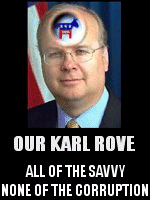Democratic Leadership,
In observing Senator Kennedy stumble through his rationales around Supreme Court nominee Alito on Meet the Press, it was clear that Democrats are in a rut on the thinking and rhetoric around this process. It was underwhelming to see the bobs and weaves he needed to perform to rationalize his past and current statements. But it's not Kennedy himself that's frustrating -- it's the entire discourse around judicial nominees these days. It's like a broken record...
"What's his judicial philosophy?"
"Will he overturn Roe v. Wade?"
"Will his ideology affect his ability to judge?"
"It's not about abortion, it's about privacy."
"Judges should not legislate from the bench."
Your terminology and approach to this debate is mundane, technical, and wonkish. We keep on hearing the same things, over and over. As a result, they don't mean much to people anymore. If you care at all about breaking through the noise and leading the debate, you need to discuss this in terms of
judicial character, values, and the law.When asked about strict constructionists or legislating from the bench, move the conversation toward your concern over a "pre-set agenda" instead:
"This debate should be less about looking back in history to see where we've gone right and wrong, and more about enforcing the laws of the land, and how we continue to form a more perfect union. Americans demand justices that respect their rights as free citizens of this country, and any judicial nominee that comes with a pre-set agenda to change the laws of this great nation -- whether it be civil rights, Roe v. Wade, or other established laws -- is suspicious and probably not suited for the job. Qualified justices of good character look at the facts of each case independently, and do not tailor outcomes according to a pre-set agenda."
When asked about judicial activism, your response should break new ground (based on moral principles) and stop blindly playing into the Republican paradigm that activism in and of itself is bad:
"Judicial activism is entirely appropriate when we're not adhering to the spirit of the Constitution, and entirely inappropriate when we are. For instance, if a justice reads that "all men are created equal" in the Declaration of Independence, and he or she looks around and sees that certain types of people can't vote, this is a just and moral cause for judicial activism. However, if a justice reads that "all men are created equal," and he or she looks around and determines that some people don't have the right to, for instance, have a marriage recognized by the state because they're "not equal" in some way, this is also judicial activism that goes clearly against our nation's values. So, in the end, this is not about activism, this is about understanding the letter and the spirit of the Constitution... and adhering to it."
When asked about ideology versus judicial philosophy, your response should focus around the ideas of "sound judgements" and decrying "pre-set agendas":
"Judicial philosophy is very different from ideology. Judicial philosophy is an approach to the role of a judge is in our government. This is the core issue we try to understand during the judicial nominiee hearings. A personal ideology - or a pre-set agenda - has no room in a justice's mind when reviewing a case on the merits and the law. As a result, personal ideologies are not part of the judicial assessment unless, of course, ideology affects a justice's ability to look at facts, interpret law, and make sound judgements. A justice's inability to make sound judgements because he or she bases them on pre-set agendas developed from a personal ideology disqualifies a justice from the Supreme Court in my opinion."
When asked about Roe v. Wade and the pro-choice and pro-life movements, your response should be inspired by pro-life Republican Senator Coburn, and separate the morals of abortion policy from the job of a Supreme Court justice:
"Nobody likes abortions. Not Democrats, Republicans, or Independents... no one wants to see abortions performed left and right. Roe v. Wade didn't create abortions, and reversing Roe v. Wade won't end abortions. Roe v. Wade is a legal and political issue, not a moral or human issue. The moral and human issue is in the hearts and minds of people who choose to have abortions. The only way to stop abortions is to convince individuals throughout our country -- and the world -- that abortion is not the right solution to their specific problem. The only way to end abortions is to ensure that in each case where a woman is up against this situation, there are options that are more beneficial to the woman than abortion. If we really want to slow or stop abortions in this country, we need to focus on providing support systems and options to women to make non-abortive options more compelling than abortive options. I see Roe v. Wade as a red herring debate - a legal issue being used as a surrogate for a debate around religious and personal values."
Only after you establish the baseline parameters for what you consider to be a qualified justice can you then begin outlining why you will -- or will not -- support Alito for Supreme Court.
Last, but not least, take the opportunity during these interviews to slip a zinger into the discourse of judicial nominees:
"Of course, a Supreme Court Justice needs to be sufficiently politically independent to fairly judge and rule in a case that might involve members of their own party in the White House."
